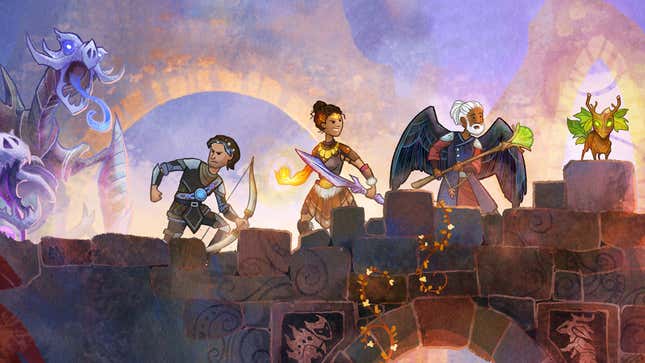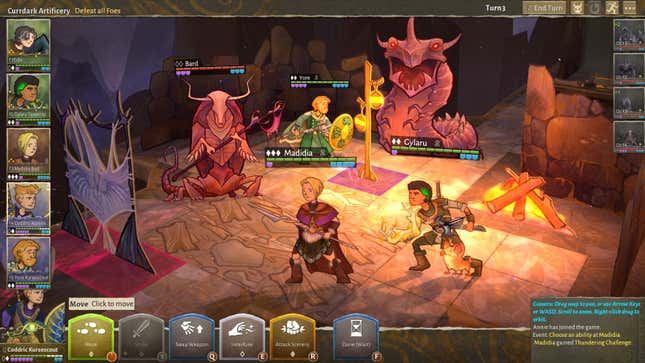
Wildermyth has already secured a spot on my Game of the Year list, and barring any unforeseen gems, it will be near the top. Here’s an example of why:
One night two women, a Mystic and a Warrior, walk into the woods. They’ve been together for a few months, their relationship as young as it is strong. They are walking into the woods because the Warrior has been possessed by a hungry ghost—it does not yet realize it is walking into its second death.
The other woman knows, has known for a few days now. Part of her wonders if she is in love with the ghost, but she knows better than that—it’s just her fear talking. She has always been quick to fear. And so they find a little cave between trees. They descend the stone-born stairs softened by water and time, and find themselves in a room with a sword. There is a legend about this blade, that it can kill a ghost. And so the woman grabs it and looks her partner in the eyes.
As a Mystic, she has always been the weaker of the two, the more easily hurt in every way, and she is a full head shorter. The muscle in her girlfriend’s toned body tenses, and then violence happens. Before the halberd blade can fall the Mystic pours her soul into a nearby stone, then sends pounds of rock hurling into her partner’s side. The Warrior stumbles from the impact, and her lover steps forward, channels the stone’s soul into the blade, and runs it through. And then she stands there, hoping she has not also murdered the woman she loves. She hasn’t. They return to their adventuring party the next day, and do not explain the new sword strapped to the Mystic’s side.
Stories like this are what Wildermyth, the recent procedurally generated, Dungeons & Dragons inspired, tactics game from developer Worldwalker Games, is all about. In it, you control an ever-expanding adventuring party as they explore, dungeon delve, and solve problems for people who can’t. The game has five prewritten campaigns, peppered with hundreds of random events. Over the course of generations you will see heroes made, and their names fall into legend. And legend is what Wildermyth does best.
This focus on legend and archetype extends to the tactics-game side of things, which is very good. Wildermyth has three classes: Warriors, Hunters, and Mystics. Warriors and Hunters resemble their most common incarnations throughout media. They are strong and sneaky, respectively. They do their jobs well.

The Mystic, on the other hand, is a unique take on a common character class. Instead of casting spells, Mystics reach out to touch objects’ souls, and manipulate the world through this process. You don’t cast “fireball,” you interfuse yourself with a fire and then compel it across a room. This means that magic is wholly dependent on the environment you’re in. Any Mystic can interfuse with any object, but abilities allow them some specialization. A naturalist will have an expanded suite of abilities when interfusing with plants, while a humanist will get a magic bonus from interfusing with a bookshelf.
Having only three classes may feel limiting at first blush, and it certainly can be in the early game, but it’s so in line with what Wildermyth is interested in. Of course there are only three classes, just as legends simplify the nuances of who people actually were. Should Junvaer, a druid who channels the power of nature into her massive scythe for unreal damage, exist in the same category as Rain Fickel, the raven-touched witch who pings distant enemies with rocks and has abandoned her staff and wand, to free her talons to strike? No! But that’s how stories work. These differences are extant, but oft forgotten in passing.
What the game lacks in explicit class diversity it more than makes up for in the ways a character’s life can shape them. One of my Warriors came into contact with a strange cave crystal that replaced one of her eyes with a gem. This significantly boosted her crit rate. Later in her life she was out in the woods with her partner, a Mystic, and was discussing her desire to feel the world through magic. They stumbled upon an altar, overflowing with energy. And so she reached into it, and was touched by the blood of the world itself.
A few missions later, by pure luck, she found a magical book that allows non-Mystics to interfuse with objects, and so a strange ad hoc battlemage was born—wielding her high-crit-chance rapier to finish off enemies she had whittled down with magic from afar. Any Warrior could share her abilities, but none of them would play like her.
Stories are living things, and Wildermyth relishes in this fact. Reputation and myth are the cornerstone of the game’s writing and narrative structure, which focuses on moments more than it does minutiae. You won’t get a text box for every day of your journey across the game’s procedurally generated maps; only the ones that matter. Only the days that you talk about over a fire.
And eventually those days become what other people talk about over a fire. As the stories of your characters spread, they start to cement themselves in local culture. At the end of a campaign you can choose a character to make into a local legend, and then start a new campaign with that same character. This is not a time-loop game, nor is it a roguelike. It’s just how stories about heroes work. They are messy and contradictory and fun.
In one campaign, a woman named Ana was our starring hero. She was incredibly powerful, made utterly broken by an AoE ability called Broadswipes which has since been patched to be more reasonable, and she was also kind, headstrong, and very gay. While in her late thirties, she recruited her mother, Blayde, who was inexplicably 26.
The game never directly acknowledged this outside of one conversation, in which Ana asked Blayde if she was supposed to call her “mom.” Blayde did not have a good answer for that. A life of heroism will lead to some amount of estrangement and emotional distance from your children, so I am sure this was a generic mother-daughter event and not specifically tied to their odd age gap. But at that moment, it didn’t feel that way. It felt like watching two people, trapped in a narrative that has outgrown them, trying to unravel an impossible contradiction...like all of the strangeness of history had been distilled into this one strained relationship between mother and daughter.
History and rumour are impossibly layered in Wildermyth. Generations of heroes come in and out of one another’s lives in strange and unexpected ways, and it doesn’t matter that it doesn’t always make perfect sense when put together. All the stories are true in some way, and most of them will make you feel something.
I’ve always loved procedural turn-based games for their ability to make space for the player’s imagination. Thinking about the relationships between my company members in Etrian Odyssey or my soldiers in XCOM has always made me fall in love with these kinds of games, and Wildermyth indulges and delights in this aspect of the genre better than any other game I’ve ever played. This makes it an easy, early contender for my Game of the Year.